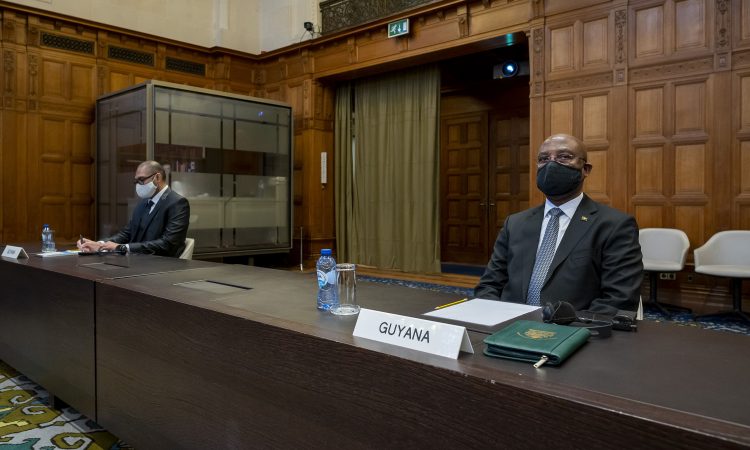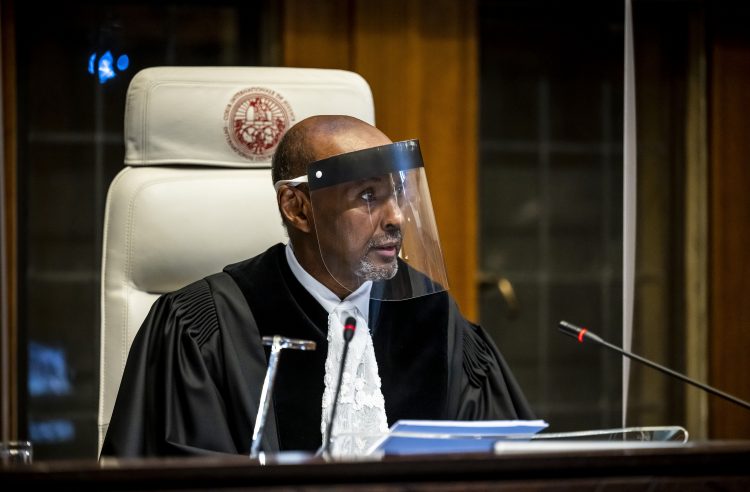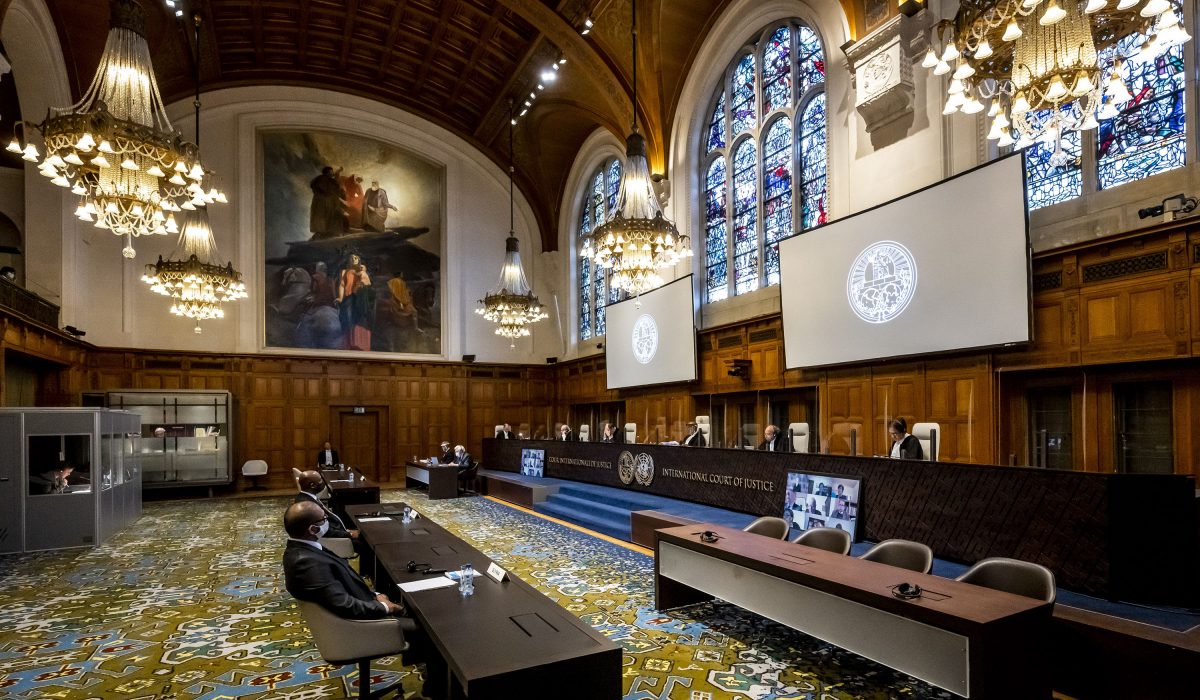The International Court of Justice (ICJ) yesterday ruled that it has jurisdiction to determine the validity of the 1899 Arbitral Award on the frontier between Guyana and Venezuela in what is seen as a major victory for this country in its bid to definitively settle a decades-old controversy.
The Court – the principal judicial organ of the United Nations – also declared that it could address the related question of the definitive settlement of the land boundary controversy between the two territories. No schedule has been fixed by the court for the hearing of the substantive case.
The decision, which was delivered by the President of the ICJ, Judge Abdulqawi Ahmed Yusuf, is based on the text, the object and purpose of the February 17th 1966 Geneva Agreement, which aimed to address the controversy over the award, as well as the circumstances surrounding the agreement’s conclusion.


Specifically, the Court, by a majority of 12 votes to four, found that “by conferring on the Secretary-General [via the Geneva Agreement] the authority to choose the appropriate means of settlement of their controversy, including the possibility of recourse to judicial settlement by the International Court of Justice, Guyana and Venezuela consented to its jurisdiction.”
It was, however, unanimously decided that the ICJ – also known as the World Court – does not have jurisdiction to entertain the claims arising from events that occurred after the signature of the Geneva Agreement. Such events include the occupation of the eastern half of the Island of Ankoko, in the Cuyuni River several months after its conclusion.
While the Court expressed disappointment that Venezuela has chosen not to participate in the case it stressed that non-participation of a party in the proceedings at any stage of the case cannot, in any circumstances, affect the validity of its judgment.
The Bolivarian Republic of Venezuela still has an opportunity to participate in the substantive case if it so desires. In fact, according to an appended comment from Justice Peter Tomka, by upholding its jurisdiction, the Court provides an opportunity for Venezuela to substantiate its contention that the 1899 Arbitral Award is null and void.
“The issue of the validity of the 1899 Arbitral Award is a legal question par excellence and no organ other than a judicial one is more appropriate to determine it,” he said, adding that in his view the UN Secretary General (SG) made a sound decision when he chose the Court as a means of settlement.
He further stressed that it is important for both states to understand that, should the 1899 Arbitral Award be declared null and void by the Court, there will need to be further submissions about the course of the land boundary, in the form of evidence and arguments, in order for it to fully resolve the issue.
When it delivered its judgment yesterday, the ICJ dismissed a contention submitted via memorandum from Venezuela that the Geneva Agreement is not sufficient in itself to found the jurisdiction of the Court but rather that the subsequent consent of the Parties is required even after the decision of the SG to choose the ICJ as the means of judicial settlement.
The Court, based in The Hague, the Netherlands, maintained that the SG’s decision would not be effective if it were subject to the further consent of the Parties for its implementation.
“An interpretation…that would subject the implementation of the decision of the Secretary-General to further consent by the Parties would be contrary to this provision and to the object and purpose of the Geneva Agreement, which is to ensure a definitive resolution of the controversy, since it would give either Party the power to delay indefinitely…by withholding such consent,” the ruling pronounced.
The decision concurs with the submissions made on June 30 by Sir Shridath Ramphal on Guyana’s behalf.
Ramphal, a former foreign minister of Guyana, had argued before the Court that it has the jurisdiction to decide that the Award which settled the boundary between Guyana and Venezuela is binding based on the plain language of the 1966 Geneva Agreement and the decision of the SG.
Plain text
“Guyana’s case is based in the plain text of the Geneva Agreement by which the parties expressly consented to accept the decision of the SG on the means of resolution of (the controversy) over the validity of the 1899 award including judicial settlement by this Court and that the (controversy) shall be settled by the International Court of Justice if that be the means chosen by the SG,” he had argued.
Justice Yusuf explained that in compliance with Article IV, paragraph 2 of the Agreement, the two parties in 1983 referred the decision on the means of settlement to the SG. The same paragraph constrained the SG to the means listed in Article 33 of the United Nations Charter, namely, negotiation, enquiry, mediation, conciliation, arbitration, judicial settlement, resort to regional agencies or arrangements, or other peaceful means of their own choice.
In early 1990, the SG chose the Good Offices process as the appropriate means of settlement. In 2018, 28 years later, the then SG, Antonio Guterres, announced that with “significant progress not having been made toward arriving at a full agreement for the solution of the controversy” he had “chosen the International Court of Justice as the means that is now to be used for its solution”.
Having established that the SG had the right to decide on a means of settlement provided that the means selected was listed in Charter and that he had the right to choose another of the means stipulated in Article 33 until either all means were exhausted or the controversy was settled, the Court turned to the question of whether the Geneva Agreement provided for a sequential application of means of settlement.
Venezuela, has contended that judicial settlement was established as a last resort within the 1966 agreement.
Specifically, it has accused the UN SG of attempting to unilaterally impose what should be the last resort.
To settle this argument the Court relied on an interpretation of the last sentence of Article IV, paragraph 2, which provides that the SG “shall choose another of the means stipulated in Article 33… and so on until the controversy has been resolved or until all the means of peaceful settlement there contemplated have been exhausted”.
The Court concluded that “the ordinary meaning” of the provision indicates that the SG is called upon to choose any of the means listed in Article 33 of the Charter but is not required to follow a particular order in doing so.
“An interpretation of Article IV, paragraph 2, of the Geneva Agreement whereby the means of settlement should be applied successively, in the order in which they are listed in Article 33 of the Charter, could prove contradictory to the object and purpose of the Geneva Agreement [since] the exhaustion of some means would render recourse to other means pointless. Moreover, such an interpretation would delay resolution of the controversy, since some means may be more effective than others in light of the circumstances surrounding the controversy between the Parties. In contrast, the flexibility and latitude afforded to the Secretary-General in the exercise of the decision-making authority conferred on him contribute to the aim of finding a practical, effective and definitive resolution of the controversy,” it was declared.
This aspect of the ruling corresponded with submissions made on Guyana’s behalf by British-French lawyer Phillippe Sands, who had stressed that there is nothing in Article IV of the Agreement or Article 33 of the UN Charter which requires the SG to choose the means of settlement in any particular order.
“The only limitations to the power of the SG to decide on the means of settlement are first he must choose from among those listed in Article 33 and second if the means first chosen failed to resolve the controversy he must choose another until the controversy is resolved or the means are exhausted,” he reminded.
Regarding the accusation that the SG acted unilaterally, the ICJ found that nothing in Article IV, paragraph 2 requires the SG to consult with the Parties before choosing a means of settlement.
“It also observes that, although the successive Secretaries-General consulted with the Parties, it is clear from the various communications of the Secretaries-General that the sole aim of such consultation was to gather information from the Parties in order to choose the most appropriate means of settlement,” they pronounced.
Finally the Court concluded that the having established that the parties consented to its jurisdiction either Party could institute proceedings by way of a unilateral application under Article 40 of the Statute of the Court.
“In light of the foregoing, the Court concludes that it has been validly seized of the dispute between the Parties by way of the Application of Guyana,” the judgment declared.
Dissenting views
This issue of whether or not the Court was properly approached is the subject of one of the two dissenting views presented.
Judge Ronny Abraham has argued that there is no title of jurisdiction allowing the Court to entertain the matter between Venezuela and Guyana upon the unilateral application of the latter.
He agreed that the SG had the authority to choose the ICJ as the next means of settlement and that he was not obliged to follow any particular order in his choice of successive means and even further that the SG’s choice is not a mere recommendation without binding effect, but that it creates certain obligations for the parties to the Agreement.
Judge Abraham, however, disagrees with the majority conclusion that Article IV, paragraph 2, establishes a binding mechanism.
“On the contrary, it is clear from several provisions of the Agreement that the parties accepted the possibility that its implementation would not necessarily result in the settlement of their dispute…in concluding the Agreement, the parties therefore did not intend to give their consent in advance to judicial settlement. In the absence of such consent, the Court should have declined jurisdiction,” he argued.
Justice Mohamed Bennouna also declared that this provision cannot establish the jurisdiction of the Court, since the Parties have not clearly and unequivocally consented to the settlement of their dispute by the Court. He argued that it is simply a provision on the choice of means.
The basis of Bennouna’s dissent is that the majority favoured the object and purpose of the Agreement, namely that of reaching a final settlement of the dispute, over the ordinary meaning of the second alternative of this provision, depriving the latter of its effective use.
“The Court concluded that the Secretary-General could consent in lieu of the Parties to the jurisdiction of the Court. This is a delegation without precedent in international practice and one that would not be subject to any temporal limitation,” he cautioned.
Bennouna also disagreed with the Court’s ruling that it had jurisdiction not only over concerns about the validity of the Arbitral Award but also over the delimitation of the land boundary between the two States.
This conclusion, Judge Bennouna maintained, ignores the ordinary meaning of the terms contained in the Geneva Agreement, in so far as the instrument only concerns the validity of the Arbitral Award of 3 October 1899.
After accepting the validity of the arbitral award from 1899 until 1962, Venezuela raised what was seen as unfounded and spurious claims about the arbitration tribunal and sought to impugn it. In the decades that followed, Venezuela used its objection to the award to hinder development projects in Essequibo and to harry oil exploration vessels off the county’s coast. At various periods since 1962, Caracas has exuded belligerence which has seen incursions into Guyana’s territory and illegal overflights. The most recent of these aggressive acts was the issuance by the Maduro administration of a maritime decree in May, 2015 seeking to claim most of Guyana’s Atlantic waters and specifically the site of ExxonMobil’s first oil well. It was a significant expansion of Caracas’ claim to Guyana’s territory and was roundly condemned here and in the Caribbean.






